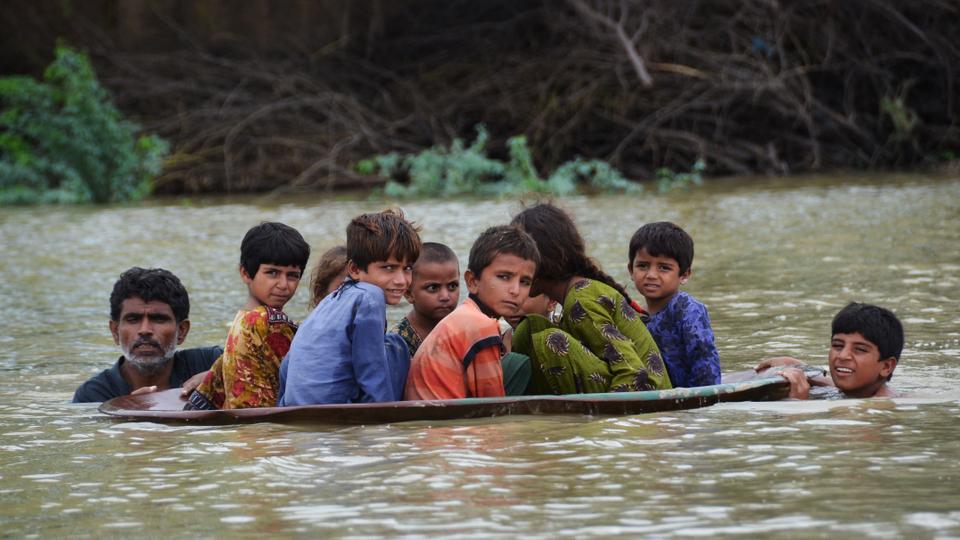Swirling floods inundate more districts and towns across the South Asian country, killing 34 more people and pushing PM Shehbaz Sharif to call on the international community for help.

Pakistani Prime Minister Shehbaz Sharif has asked for international help in battling deadly flood damage in the South Asian nation as rescuers struggled to evacuate thousands of marooned people from flood-hit areas and dozens more died.
Sharif's appeal on Friday came as exceptionally heavy rain continue lashing Pakistan and the death toll reached 937 since mid-June, more than a third of them children.
Swirling floods inundated more districts and towns, killing another 34 people over the past 24 hours, officials and local media reported.
The majority of the deaths were reported from southern Sindh, where 16 people lost their lives followed by southwestern Balochistan, where another 13 people died in rain-related mishaps, officials said.
The remaining fatalities were reported in northeastern Punjab and the northern Gilgit-Baltistan region, which borders China.
"The ongoing rain spell has caused devastation across the country," PM Sharif tweeted, thanking other countries and groups for their support. "Together we will build back better."
Later, he met with foreign diplomats and representatives of international aid agencies to brief them about the damages. A government statement quoted Sharif as saying 300 children were among the dead.
Sharif said the scope of the devastations caused by rains and floods this time was worse than in 2010 when floods killed 1,700 people. He blamed the "horrors of climate change" for the tragedy.
He visited flood-hit areas in Sindh province on Friday, assuring flood victims of the government's support. Some 6,500 Pakistani troops are taking part in the search and rescue operations and have so far evacuated more than 40,000 people.
Pakistani TV footage on Friday showed a raging Swat River destroying the iconic New Honeymoon Hotel in the northwestern tourist resort of Kalam. There were no casualties as tourists and staff left the hotel on Wednesday, following government evacuation instructions.
Pakistan has called on the international community to help as it struggles to cope with the aftermath of torrential rains that have triggered massive floods, killing at least 1,000 people and destroying tens of thousands of homes and livestock pic.twitter.com/Hwco4zSeOH
— TRT World (@trtworld) August 27, 2022
Disaster of epic proportions
Floods have destroyed around 220,000 homes, left 500,000 more badly damaged, washed away roads and destroyed nearly 150 bridges, officials said.
Although floodwaters receded in some areas, the situation worsened in Sindh province, where rescue workers were using boats to evacuate people. Thousands of flood-affected people were living in makeshift homes and tents.
The United Nations on Thursday said it has allocated $3 million for UN aid agencies and their partners in Pakistan to respond to the floods.
The World Bank has announced $350 million, World Food Program $110 million, Asian Development Bank $20 million, and UK Aid over $40 million for flood victims, according to the PM's office.
Monsoon rains in Pakistan typically begin in July. But this year, heavy downpours started in June, triggering floods. Scientists say the climate crisis is a major factor behind the unusually severe weather.
Historic monsoon rains and flooding in Pakistan have affected more than 30 million people over the last few weeks, the country's climate change minister said on Thursday, calling the situation a "climate-induced humanitarian disaster of epic proportions".
Social media is bold.
Social media is young.
Social media raises questions.
Social media is not satisfied with an answer.
Social media looks at the big picture.
Social media is interested in every detail.
social media is curious.
Social media is free.
Social media is irreplaceable.
But never irrelevant.
Social media is you.
(With input from news agency language)
If you like this story, share it with a friend!
We are a non-profit organization. Help us financially to keep our journalism free from government and corporate pressure













0 Comments